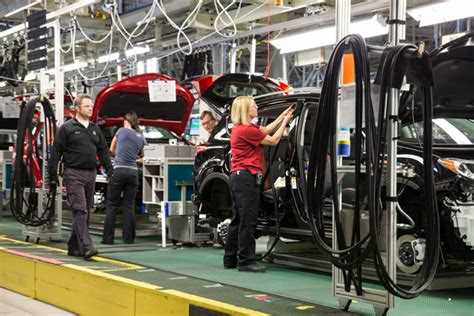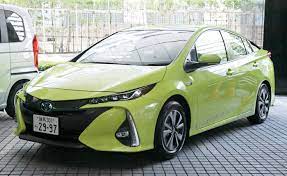
Toyota, a leading automotive manufacturer, is dedicated to preserving the environment and promoting sustainable practices. With a strong commitment to reducing carbon emissions and developing innovative green technologies, Toyota is at the forefront of the sustainable mobility revolution.
Green Initiatives:
Toyota has implemented a range of green initiatives to minimize its environmental impact. The company is constantly striving to improve the fuel efficiency of its vehicles, reducing CO2 emissions and promoting eco-friendly driving habits.
Through advanced research and development, Toyota has revolutionized the automotive industry with hybrid vehicles. The Toyota Prius, for example, is one of the most popular and successful hybrid cars on the market. Its innovative hybrid engine combines a conventional gasoline engine with an electric motor, resulting in significant fuel savings and reduced emissions.
Electric Vehicles:
In addition to hybrid cars, Toyota is also investing heavily in electric vehicles (EVs). The company recognizes the importance of transitioning to a zero-emission future, and electric vehicles play a vital role in achieving this goal.
Toyota’s electric vehicle lineup includes models such as the Toyota RAV4 EV and the Toyota Mirai, a hydrogen fuel cell electric vehicle. These vehicles offer zero-emission driving, providing a sustainable and eco-friendly transportation solution.
Furthermore, Toyota is actively working on developing cutting-edge battery technology to improve the range and performance of their electric vehicles. By investing in research and innovation, Toyota aims to make electric vehicles more accessible and practical for everyday use.
“At Toyota, we believe that sustainable mobility is the key to a better future. Through our green initiatives and electric vehicles, we are driving forward the transition to a cleaner, greener, and more sustainable world.”
In conclusion, Toyota’s commitment to sustainability is evident in their green initiatives and electric vehicles. By continuously pushing the boundaries of automotive technology, Toyota is playing a crucial role in creating a more sustainable and environmentally-friendly future.
About Toyota’s Commitment
Toyota is committed to sustainability and is taking steps to reduce its environmental impact through various green initiatives and the development of electric vehicles. With a deep understanding of the importance of environmental responsibility, Toyota is dedicated to creating a sustainable future for all.
As a global leader in the automotive industry, Toyota is actively working to reduce greenhouse gas emissions and promote clean energy solutions. The company has set ambitious goals to achieve net-zero carbon emissions by 2050 and has implemented measures to drive innovation and efficiency throughout its operations.
Toyota’s commitment to sustainability extends to its product lineup, with a focus on developing and manufacturing electric vehicles (EVs). The company recognizes the urgent need to transition to zero-emission vehicles and is investing heavily in the research and development of EV technologies.
In addition to EVs, Toyota also offers a range of hybrid vehicles, which combine the benefits of electric and gasoline power to reduce fuel consumption and emissions. The Toyota Prius, one of the world’s first mass-produced hybrid vehicles, has become synonymous with eco-friendly driving and has paved the way for the widespread adoption of hybrid technology.
Furthermore, Toyota is actively involved in promoting sustainability beyond its own operations. The company engages in partnerships and collaborations with other organizations to drive environmental initiatives and support the development of sustainable communities.
With its unwavering commitment to sustainability, Toyota is leading the way towards a greener future. Through its green initiatives and the development of electric vehicles, the company is working towards a world where mobility is not only efficient and convenient but also environmentally responsible.
Green Initiatives
Toyota is committed to sustainability and has implemented a range of green initiatives to reduce its environmental impact. These initiatives include:
-
Hybrid Electric Vehicles: Toyota has been a pioneer in hybrid electric vehicle technology, with models like the Prius leading the way. These vehicles combine a conventional gasoline engine with an electric motor, resulting in lower emissions and improved fuel efficiency. By driving a Toyota hybrid, you can reduce your carbon footprint and contribute to a greener future.
-
Zero-Emission Vehicles: In addition to hybrid vehicles, Toyota is also investing in zero-emission vehicles, such as electric and fuel cell vehicles. These vehicles produce no tailpipe emissions, helping to improve air quality and reduce greenhouse gas emissions. Toyota’s commitment to zero-emission vehicles is evident in models like the Mirai, which runs on hydrogen fuel cells and emits only water vapor.
-
Efficient Manufacturing Processes: Toyota is focused on making its manufacturing processes more efficient and sustainable. The company has implemented measures to reduce energy consumption, water usage, and waste generation in its factories. By adopting greener manufacturing practices, Toyota aims to minimize its environmental impact throughout the entire lifecycle of its vehicles.
-
Recycling and Resource Conservation: Toyota is committed to recycling and resource conservation. The company actively promotes the recycling of end-of-life vehicles and their components. Toyota also strives to reduce the consumption of natural resources by using recycled materials in its vehicles and packaging. By reusing and conserving resources, Toyota aims to contribute to a more sustainable future.
-
Partnerships and Collaboration: Toyota understands that addressing sustainability challenges requires collaboration. The company actively seeks partnerships with other organizations, governments, and stakeholders to drive innovation and find solutions to environmental issues. By working together, we can create a greener and more sustainable future for all.
At Toyota, green initiatives are not just a trend but a core commitment. Through the development of hybrid and zero-emission vehicles, implementation of efficient manufacturing processes, recycling and resource conservation efforts, and partnerships with other stakeholders, Toyota is driving towards a greener future. Join us in our commitment to sustainability and make a positive impact on the environment.
Sustainable Manufacturing Processes

At Toyota, we are committed to implementing sustainable manufacturing processes throughout our production facilities. We believe that reducing our environmental impact is not just a responsibility, but also an opportunity to innovate and create a better future.
Our sustainable manufacturing processes begin with the materials we use. We strive to source materials that are environmentally friendly and have a minimal carbon footprint. This includes using recycled materials whenever possible and working with suppliers who share our commitment to sustainability.
In addition to the materials we use, we also focus on energy efficiency in our manufacturing processes. We have implemented various measures to reduce energy consumption, such as installing energy-efficient machinery, optimizing production line layouts, and utilizing renewable energy sources. By minimizing our energy usage, we aim to lower greenhouse gas emissions and contribute to a cleaner environment.
We also prioritize waste reduction and recycling in our manufacturing processes. Through careful planning and continuous improvement, we aim to minimize waste generation and maximize the recycling of materials. We have implemented recycling programs for various waste streams, including plastics, metals, and paper. By reducing waste and promoting recycling, we aim to conserve natural resources and reduce the burden on landfills.
Furthermore, we prioritize the health and safety of our employees by implementing sustainable manufacturing practices. We provide comprehensive training programs to ensure that our employees are equipped with the knowledge and skills necessary to work safely and responsibly. We also maintain rigorous safety standards and regularly conduct audits to identify areas for improvement.
Overall, our commitment to sustainable manufacturing processes is an integral part of our dedication to environmental stewardship. By continuously striving to reduce our environmental impact, we aim to create a sustainable future for generations to come.
Renewable Energy Sources

At Toyota, we are committed to sustainability and reducing our environmental impact. As part of our green initiatives, we are proud to utilize renewable energy sources in our operations.
Renewable energy sources, such as solar and wind power, play a crucial role in reducing greenhouse gas emissions and combating climate change. That’s why we have invested in solar panels and wind turbines to power our manufacturing plants and offices.
By harnessing the power of the sun and wind, we are able to significantly reduce our reliance on fossil fuels and decrease our carbon footprint. This not only benefits the environment, but also helps to create a more sustainable future for generations to come.
In addition to using renewable energy sources in our own operations, we are also working to promote their adoption in communities around the world. Through initiatives like the Toyota Environmental Challenge 2050, we are partnering with local governments and organizations to support the development of renewable energy infrastructure.
Renewable energy is a key part of our commitment to sustainable mobility. As we continue to develop electric vehicles, we are striving to ensure that the energy used to power them comes from clean and renewable sources. By combining renewable energy with innovative technology, we aim to create a greener and more sustainable transportation system for all.
Waste Reduction and Recycling
At Toyota, we are committed to reducing waste and promoting recycling as part of our sustainability efforts. We believe in creating a greener future by minimizing our environmental impact and maximizing the use of resources.
One of our key initiatives is implementing waste reduction measures throughout our production processes. We have implemented lean manufacturing principles to eliminate waste and improve efficiency. This includes reducing the amount of packaging materials used, optimizing inventory management, and streamlining production processes to minimize scraps and rejects.
In addition to waste reduction, we also prioritize recycling as a means to minimize our carbon footprint. We have established recycling programs within our manufacturing facilities to ensure that materials such as plastics, metals, and paper are recycled and reused whenever possible. This helps conserve natural resources and reduces the need for new raw materials.
To further promote recycling, we actively engage with our suppliers and customers to encourage responsible disposal and recycling of our products. We provide information and resources on proper recycling methods to ensure that our products are disposed of in an environmentally-friendly manner at the end of their lifecycle.
Furthermore, we are investing in research and development to explore innovative recycling technologies. Our goal is to find new ways to recycle and repurpose materials that were previously considered non-recyclable, further reducing waste and promoting a circular economy.
Overall, waste reduction and recycling are integral parts of our commitment to sustainability. By continuously improving our processes and working towards a zero-waste future, we strive to create a better and cleaner world for generations to come.
Electric Vehicles
Toyota is leading the way in sustainable transportation with its innovative electric vehicles. With a strong commitment to reducing carbon emissions and preserving the environment, Toyota has developed a range of electric vehicles that offer both efficiency and performance.
One of Toyota’s flagship electric vehicles is the Toyota Prius Prime, a plug-in hybrid that combines the benefits of electric power with the convenience of a gasoline engine. The Prius Prime offers an impressive all-electric range, allowing drivers to travel emissions-free for shorter trips, while still having the option for longer journeys with the hybrid mode.
In addition to the Prius Prime, Toyota has also introduced the Toyota Mirai, a hydrogen fuel cell electric vehicle. The Mirai uses hydrogen gas to power its electric motor, emitting only water vapor as a byproduct. This groundbreaking technology represents the future of zero-emission vehicles, offering a sustainable and clean solution to transportation.
Toyota’s commitment to sustainability extends beyond its electric vehicles. The company is also investing in research and development to improve battery technology, increase charging infrastructure, and promote renewable energy sources for powering its electric vehicles. By taking a holistic approach to sustainability, Toyota is ensuring a greener future for generations to come.
When you choose a Toyota electric vehicle, you’re not only choosing a vehicle that is better for the environment, but also a vehicle that offers cutting-edge technology, reliability, and a superior driving experience. Discover the power of electric with Toyota and join the movement towards a cleaner, greener future.
Hybrid Technology
Toyota is at the forefront of the automotive industry with its innovative hybrid technology. Combining the power of a gasoline engine and an electric motor, Toyota’s hybrid vehicles deliver exceptional performance while reducing emissions and fuel consumption.
With Toyota’s hybrid technology, drivers can enjoy the best of both worlds – the efficiency of an electric vehicle and the convenience of a gasoline engine. The electric motor provides instant torque for quick acceleration, while the gasoline engine ensures a longer driving range without the need for frequent recharging.
Toyota’s hybrid vehicles also feature regenerative braking, which converts kinetic energy into electricity to recharge the battery while braking or decelerating. This cutting-edge technology not only improves fuel efficiency but also reduces wear and tear on the brake pads, resulting in lower maintenance costs.
Furthermore, Toyota is committed to sustainability and is continuously working on improving its hybrid technology. The company aims to reduce the environmental impact of its vehicles by introducing more efficient hybrid systems and increasing the availability of plug-in hybrid and electric models.
Experience the future of automotive technology with Toyota’s hybrid vehicles. Whether you’re looking for a fuel-efficient sedan, a versatile SUV, or a stylish hybrid sports car, Toyota has a wide range of hybrid options to suit your needs and preferences. Choose Toyota and drive towards a greener, more sustainable future.